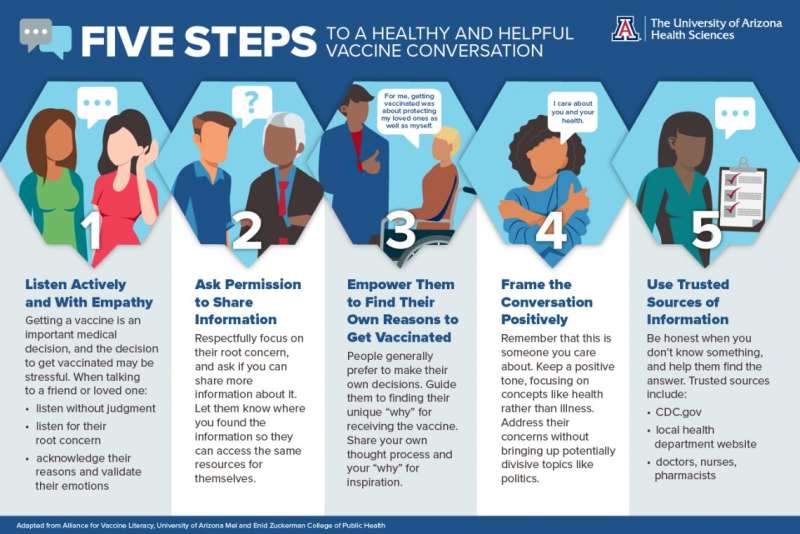
As flu season collides with the holidays and Arizona’s continuing COVID-19 incidence, many people are taking steps to reduce their risk for illnesses. But with so much misinformation and apprehension about vaccines circulating, rifts can appear among friends and families when not everyone shares the same perspective.
In response, University of Arizona Health Sciences students and faculty are working to figure out how to reach vaccine-hesitant individuals and communicate more effectively. Mel and Enid Zuckerman College of Public Health doctoral student Maiya Block has spearheaded a series of virtual workshops to help people navigate these challenging conversations, giving participants the opportunity to learn communication techniques and practice using them in role-playing scenarios.
“Personally, I’ve been struggling, and a lot of people on our research team have family members or friends who are not getting vaccinated,” Block said. “They were not sure how to talk about it in an effective manner. People get their feelings invested, and it’s difficult to see eye to eye.”
The continuum of hesitancy
Being unvaccinated doesn’t mean someone is “anti-vax,” or categorically opposed to getting a vaccine. Assuming they have access to the shot, it often means they have concerns that aren’t being adequately addressed. This phenomenon is called vaccine hesitancy.
“Vaccine hesitancy is on a continuum, from not getting a recommended vaccine immediately, to delaying it for months, sometimes years, to maybe never,” said Purnima Madhivanan, associate professor of health promotion sciences and director of the Global Health Training Program. “Anti-vax refers to a person who may be against all vaccines or are suspicious about one specific vaccine, like the COVID vaccine.”
According to the Arizona Department of Health Services, nearly 64% of Arizonans are vaccinated against COVID-19—too low to provide community-wide protection. The most vulnerable remain at risk, and breakthrough infections and new viral variants are looming threats. As lawmakers debate policy, Block and her fellow students believe individuals can be powerful forces for change within their own social networks.
Tips and tricks
Over the summer, Block and other students involved in the Alliance for Vaccine Literacy organized virtual workshops providing guidance for approaching vaccine-hesitant loved ones. The workshops continued in the fall semester.
“We talk about tips and tricks that help us engage in a conversation and not just talk ‘at’ each other, creating opportunity for people to engage in dialog and ask questions openly without feeling judged,” Block said. “That’s difficult with these kinds of sensitive topics.”
The first step is to listen actively, Block said. Don’t wait for someone to stop speaking so you can jump in with your argument. Listen with empathy, trying to understand the root of their concerns.
“It’s important to tailor our conversations to the specific issue the person is concerned about,” Madhivanan said. “A one-size-fits-all approach is not going to work.”
“Understand the other person’s point of view and where they’re coming from. Reflect back what they’re saying and request clarification to verify what you’re understanding,” Block added. “Then, with their permission, you can share good information from sources they trust. Identify what those sources are, and find information from those sources that might support your cause.”
Madhivanan and Block suggest aligning your approach with the other person’s values, such as being healthy or spending time with loved ones.
“It’s important to focus on commonalities,” Block said. “The first conversation has to be centered on setting the tone where you and the other person are on the same side, not arguing against each other. Once you start talking too much about your differences, it turns into a debate rather than a conversation.”
Block says it’s important not to spread misinformation yourself.
“It’s OK to say, “I don’t know.” If you’re not sure about something, come back to them at a better time,” Block said.
One topic that has come up repeatedly in the workshops is that the issue is so emotionally charged that conversations can quickly be derailed.
“It’s easy to say, “Yeah, I’m going to listen,” but to actually do it in the moment, especially when you’re feeling all these emotions, is difficult,” Block said. “Finding the right moment to have the conversation is key. If you’re not in the right place emotionally, that probably isn’t a great time.”
Madhivanan adds that empathy, kindness and civility are paramount in effective communication.
“If they think you’re talking down to them, they’re going to shut you off, and you missed out on a unique opportunity,” Madhivanan said, adding that this is not a one-and-done conversation. “These things take time. It can’t be done in one sitting. It has to be over a period of time.”
One conversation at a time
The Alliance for Vaccine Literacy includes UArizona undergraduate students, graduate students and faculty. The group’s overarching goal is to improve communication about the safety and efficacy of vaccination with the general public. The workshops are one of many endeavors the group oversees.
“The Alliance for Vaccine Literacy is an important project founded by health sciences faculty and fueled by the enthusiasm and talents of our incredible students. For them, education isn’t just about training for tomorrow—it’s about making a healthier world today,” said Dr. Michael D. Dake, senior vice president for health sciences. “The contributions of these students are helping to mitigate the effects of the pandemic one conversation at a time.”
For Madhivanan, the one-conversation-at-a-time approach gives everyone, not just lawmakers and media figures, a place in the public discourse. She optimistically points out that most people are persuadable, referencing ongoing research by the Kaiser Family Foundation showing that only 16% of U.S. adults say they will “definitely not” get a COVID-19 vaccine.
Source: Read Full Article
